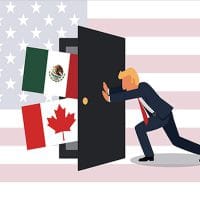-
The New York Times and the U.S. Border wall: A love story
The New York Times’ radical reasonableness offers us a clear vision of the ways one can continuously adapt its position to the political context as to be in position of respectful negotiation with the status quo.
-
The Mexican earthquakes in perspective
Mexico suffered two powerful earthquakes in September 2107. The first, with magnitude 8.2 took place on September 7. With its epicenter off the Pacific coast of southern Mexico, it caused damage mainly in the states of Chiapas and Oaxaca. The second took place on September 19 and had a magnitude of 7.1, with its epicenter about 75 miles (120 kilometers) southeast of Mexico City, damaged the surrounding area, including Mexico City.
-
Dr. Ernesto in Mexico
Ernesto Guevara’s medical colleagues, both in Peru and Mexico, agree that he was profoundly interested in the social function of medicine, and that he had the makings of a researcher, although politics dominated his extraordinarily analytical mind.
-
Trump is trying to make NAFTA even worse
Many on the Left have been deeply critical of the North American Free Trade Agreement (NAFTA) since before it was fast-tracked into law by former President Bill Clinton in 1994. Now, President Donald Trump’s current plan to renegotiate NAFTA is poised to make the massive trade deal even worse.
-
Rebuilding the American labor movement—the Southern front
The major contradiction for working people in the USA in the 21st century is now abundantly clear: while working for a living is a necessity for the majority of Americans and the wealth of the nation continues to grow, real wages and the number of decent jobs are in steady decline.
-
The Election of Donald Trump
1. The recent election of Donald Trump after Brexit, the rise of fascist votes in Europe, but also and much better, the electoral victory of SYRIZA and the rise of Podemos are all manifestations of the depth of the crisis of the system of globalized neoliberalism. This system, which I have always considered unsustainable, is imploding before our eyes at its very heart. All attempts to save the system — to avoid the worst — by minor adjustments are doomed to failure.
-
Job Loss, the Clintons, NAFTA, and a New Progressive Labor Rights Agenda
Today’s post discusses the way that neoliberal policies embraced by the Democratic Party resulted in job loss in key states. Bear with me: there are facts and figures here that make the case. Tomorrow, I will continue to discuss these issues in the context of “domestic” job displacement. The third post will discuss a progressive […]
-
Spanish Recollections: the 80th Anniversary of the International Brigades
In one hurrying day, eighty years ago, in Albacete, a center of Spain’s La Mancha region, a few officers somehow created quarters for five hundred men arriving the following day, then five hundred more, and more. Soon three or four thousand, somehow organized in units despite a mad variety of languages, were issued a motley […]
-
Interview with Steve Ellner: Is the Bolivarian Revolution a Populist Failure?
In part II of our interview with Steve Ellner, the Universidad de Oriente professor discusses a range of contentious issues in Venezuela, including the efficacy of state social programs such as the CLAPs, rentierism, and the Maduro government’s controversial Mining Arc, as well as the role of international solidarity. Part I of the conversation can […]
-
Interview with Steve Ellner: Democratization of PSUV Is Key to Chavismo’s Future
Distinguished Venezuelan history and politics professor Steve Ellner visited Caracas from September 26 to October 7 to teach an intensive seminar at the Venezuelan Planning School, titled “The Role of the Venezuelan State in the Transition to Socialism.” Venezuelanalysis‘s Lucas Koerner sat down with the long-time Universidad de Oriente professor to discuss a range of […]
-
We Stand with Palestine in the Spirit of “Sumud”
At a moment of growing resistance to state violence and injustice the world over, a delegation of nineteen anti-prison, labor and scholar-activists from the United States traveled to Palestine in March 2016. Our delegation included former U.S.-held political prisoners and social prisoners, former Black Panther Party members, prison abolitionists, trade unionists and university professors. We […]
-
Are Sanders and Fair Trade a Threat to the Global Poor?
On April 24, 2013, some 1,134 people died in the collapse of the Rana Plaza complex outside Dhaka, the capital of Bangladesh. The building housed factories where low-wage workers, largely women, stitched garments for the U.S. and European markets. For several years before the disaster a number of U.S. opinion makers — notably New York […]
-
Failing to Connect the Dots on Immigration: The Democratic Debate in Miami
The March 9 debate in Miami between Hillary Clinton and Bernie Sanders was the first chance the two candidates for the Democratic presidential nomination had to discuss immigration and its connections to trade and U.S. policy in Latin America. Unfortunately, neither candidate took advantage of the opportunity. The mainstream “immigration debate” generally avoids mentioning the […]
-
The Challenge Before the Latin American Left
The Left upsurge in Latin America appears to be abating. In October 2015 Jimmy Morales, the conservative candidate in Guatemala, defeated the Left-leaning Sandra Torres in the presidential elections. On November 22, Mauricio Macri, the conservative presidential candidate in Argentina, defeated Daniel Scioli, his Peronist rival, by a narrow margin, to bring to an […]
-
A New Political Situation in Latin America: What Lies Ahead?
“Venezuela defines the future of the progressive cycle” In your work on South America, you speak of the duality that has characterized the last decade. What exactly is that duality? Claudio Katz: In my opinion, the so-called progressive cycle of the last decade in South America has been a process resulting from partially successful […]
-
The Liberals and Inequality, Then and Now
Articles on income equality sometimes note that the U.S. economy hasn’t faced the current level of disparity since 1928, on the eve of the Great Depression. There has been much less discussion of the responses to the issue back then, even though income inequality was a major concern for policymakers as the Depression deepened and […]
-
Marta Harnecker on New Paths Toward 21st Century Socialism
Introduction by Richard Fidler Among the many panels and plenaries at the Conference of the Society for Socialist Studies, which met in Ottawa June 2-5, was a Book Launch for Marta Harnecker’s latest English-language book, A World to Build: New Paths toward Twenty-First Century Socialism (translated by Federico Fuentes), Monthly Review Press. The featured speaker […]
-
An Interview with Dawn Paley, Author of Drug War Capitalism
Dawn Paley is a Canadian author. Drug War Capitalism (AK Press, November 2014) is her first book. We conducted an e-interview as protests grew against police and military policies in Mexico and the U.S. The drug war on both sides of the border has played no small role in generating such dissent. Seth Sandronsky: Can […]
-
The Problem Is Capitalism
NYC Climate Convergence, September 20, 2014 A. The Environmental Crisis The “environmental crisis” is actually a number of crises, including the following: climate change; acidification of the oceans (related to elevated atmospheric CO2 levels); pollution of air, water, soil, and organisms with harmful substances; degradation of agricultural soils; destruction of wetlands and tropical forests; and […]
-
Unraveling Capitalist Globalization
Despite the prolonged global economic crisis since 2007/2008, neo-liberal economic thought and practice continue to reign supreme. In his important book Capitalist Globalization: Consequences, Resistance, and Alternatives (Monthly Review Press, 2013), Martin Hart-Landsberg makes a number of key interventions unraveling the myth of neo-liberalism as well as the dynamics underlying capitalist accumulation. First, he identifies […]






